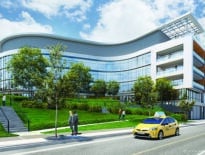A dynamic real estate market and public health crisis have collided in Boston’s Newmarket industrial neighborhood in recent years.
A new MBTA commuter rail station has attracted interest in property acquisitions by major developers, while a growing homeless encampment and cluster of opioid treatment centers branded the neighborhood with the “Methadone Mile” label and calls for action.
Amid complaints about crime and sidewalks strewn with drug paraphernalia and human waste, business owners are proposing the creation of Boston’s third business improvement district to pay for sanitation, security and private shuttles from MBTA stops to local employers. The measure appears to enjoy broad support among Newmarket landlords, with approximately 85 percent of the parcel owners signing a petition that will be submitted to the Boston City Council this fall.
“It makes sense for everybody to look at security, safety and having a better environment for businesses today and tomorrow,” said John Cremmen, a senior vice president at Denenberg Realty Advisors and a director of the Newmarket Business Association. The business group estimates the program would cost $3.5 million annually.
Opioid Crisis Scuppers Deals
The shuttle service would run in 15-minute intervals from businesses to nearby transit stations including the Newmarket commuter rail stop and up to four stations on the Orange and Red lines including Broadway, Andrew, Back Bay and Ruggles, said Susan Sullivan, executive director of the Newmarket Business Association. An estimated 10 BID employees would provide maintenance and services support and up to six additional outreach workers would be hired to focus on public health outreach.
“The hardest question we get all the time is: Isn’t this something that should be paid by the city? And the answer really is the city puts a lot of resources down here,” Sullivan said. “But sometimes areas need more, and if you want to make a difference and see improvement then sometimes you do need to supplement it.”
More than 8,300 people work in the neighborhood at major employers including Boston Medical Center. The BID would include escort services to vehicles upon request and enhanced private security, Sullivan said.
Joel Miller spent 20 years working for his father’s meatpacking business in Newmarket before venturing into industrial real estate brokerage. While he said the neighborhood’s central location and transportation network remains ideal for industrial uses, the drug epidemic has started to affect potential tenants’ decision-making.
“Sometimes you’ve just got to handle things on your own when the city does nothing, and the state does nothing,” said Miller, president of commercial and industrial broker Perishable Management Services. “It’s just a matter of survival to these people. We’ve had had deals fall apart recently because some of the people who wanted to buy there gave up. They see the drug deals and say they’re not drinking the Kool-Aid anymore.”

The proposed Newmarket Business Improvement District would encompass a large area in Boston’s industrial heart. Boston Planning & Development Agency image
Michael Feldman, president of a surveying business and owner of its headquarters office building at 152 Hampden St., said he’s seen the benefits of a BID in Worcester, where his company has a branch office in the Downtown Worcester Improvement District.
“I go to my Worcester office and I see people sweeping the street and keeping it ocean, and Newmarket could really use this whether it’s security or a shuttle to take employees to the stations,” Feldman said. “It’s just going to add value to the neighborhood and our properties.”
The additional fee on the 21,000-square-foot Hampden Street building would be about $13,000 a year, he said.
State law allows the formation of business improvement districts in contiguous geographic areas where at least 75 percent of the land is zoned for commercial, industrial or mixed use. Approval is contingent on support from owners of at least 60 percent of the properties, including those representing a minimum 51 percent of the assessed valuation within the district.
Property owners in the Downtown Crossing neighborhood formed Boston’s first BID in 2011 to hire a team of “ambassadors” who provide maintenance, cleanup and information to visitors. In 2017, landlords of properties bordering the Rose Fitzgerald Kennedy Greenway agreed to form a BID that provides operations, maintenance and improvements to the 17-acre chain of downtown parks.
Pressure on a Shrinking Industrial Core
The city’s Imagine Boston 2030 master plan identifies parts of Newmarket for potential rezoning for mixed–use projects while preserving the core of existing industrial tenants such as food wholesalers. Asking prices for some industrial properties have topped $20 per square foot amid shrinking availabilities, Denenberg Realty’s Cremmen said.
“There’s been so much land gobbled up in the rest of the city, and this is the last remaining area in a logistical focal point,” he said.
The Record Co. began laying down tracks in Newmarket in 2011 after finding affordable space in an aging warehouse and renting out recording studio space on an hourly and daily basis to local musicians.
“There’s a long history of creative people working in industrial neighborhoods, because those two vibes and cultures work well together,” founder and Executive Director Matt McArthur said. “It’s still manufacturing space: we’re just making music, not widgets.”
Newton-based National Development acquired The Record Co.’s home at 960 Massachusetts Ave. for a repositioning project, including a 25,000-square-foot third-story addition, and the recording studio agreed to relocate to a 12,500-square-foot suite within the building. Scheduled for completion in early 2021, the space will increase The Record Co.’s booking capacity tenfold, McArthur said.

Steve Adams
For the studio, which is located a 10-minute walk from the most heavily-used bus stop and 20 minutes from a subway station, transportation upgrades are the most attractive benefit of the BID.
“If there were a shuttle that was regular and safe and accessible price-wise for our staff and our 20,000 customers a year, that would be the best. That walk is not pedestrian-friendly by any means,” McArthur said.
National Development is marketing the remaining 68,000 square feet of availability to office and flex tenants, Vice President Matthew Davis said. The approval of the BID would provide benefits to property owners similar to the turnaround at Downtown Crossing, Davis said.
“We’ve been very supportive of the BID because we’ve seen it be a success story,” he said.






